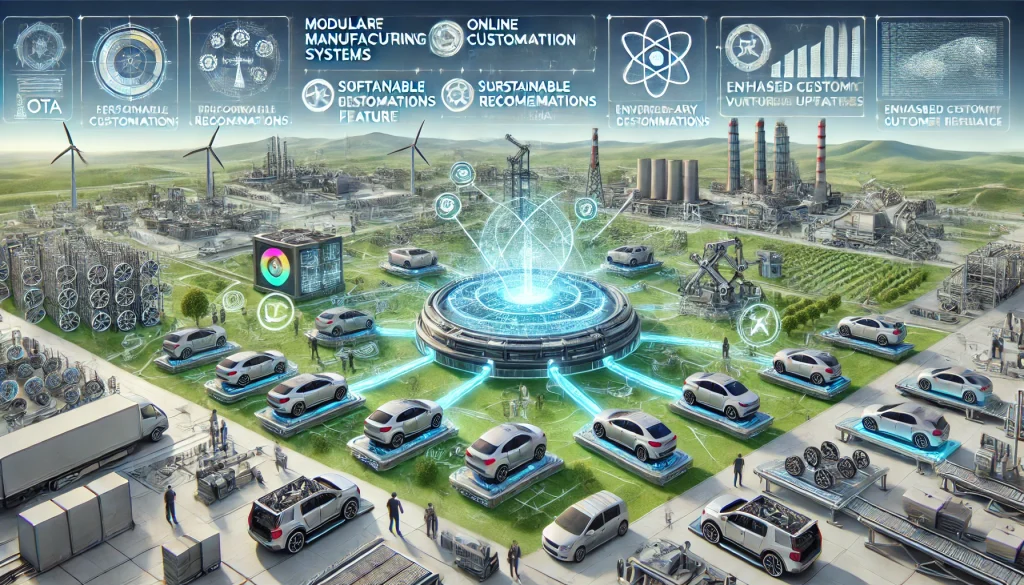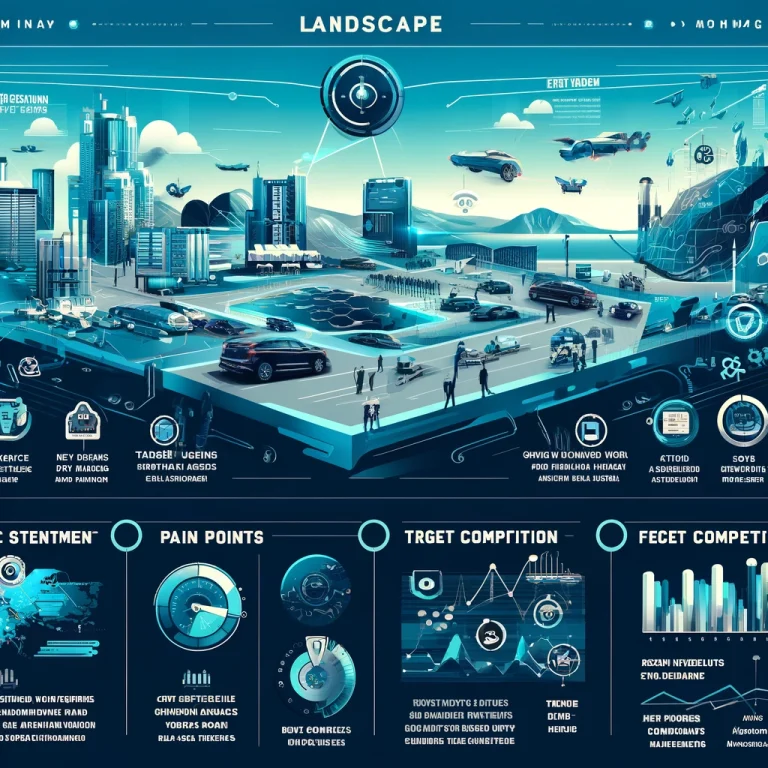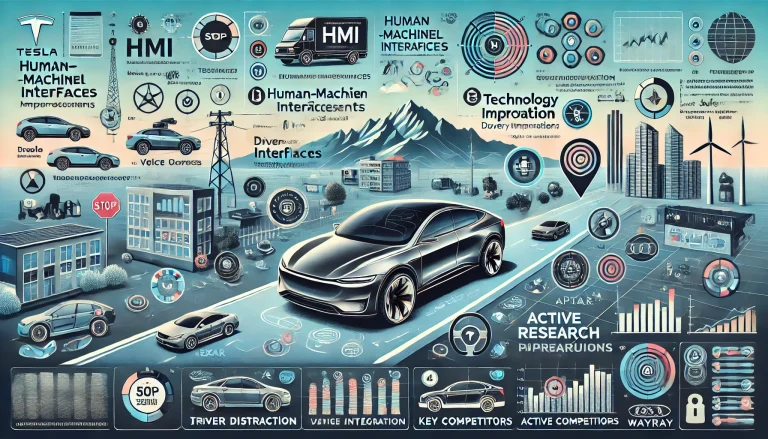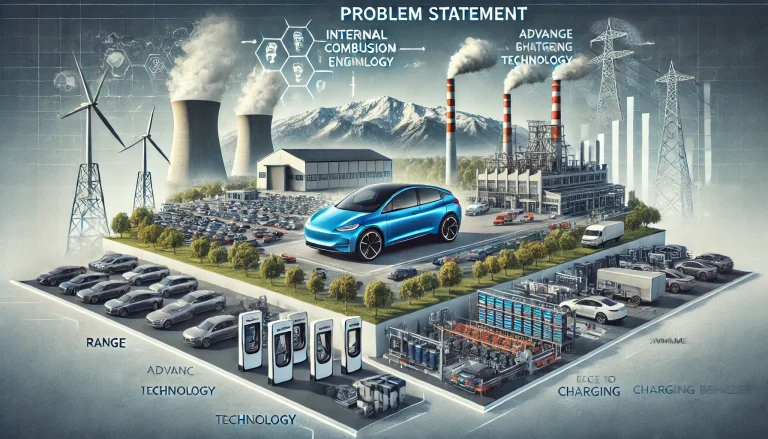Problem Statement
In today’s automotive market, consumers are no longer satisfied with standard, off-the-shelf vehicles. Instead, they seek vehicles that reflect their personal style, preferences, and lifestyle needs. This growing demand for personalization is driving significant changes in how vehicles are designed, manufactured, and sold. Advances in manufacturing technologies, such as 3D printing and modular assembly, alongside digital innovations like software-driven features and performance tuning, are enabling a new era of automotive customization.
Traditional manufacturing methods often limit the extent to which vehicles can be customized. However, with the advent of digital design tools, flexible manufacturing processes, and smart technologies, automakers are now able to offer a wide range of customization options. Consumers can choose everything from exterior colors and interior materials to software-based features that enhance the driving experience, such as personalized infotainment systems, driver assistance technologies, and even performance settings.
The shift towards greater customization presents both opportunities and challenges for the automotive industry. On the one hand, it allows manufacturers to differentiate their products, attract more customers, and charge premium prices for personalized features. On the other hand, it requires significant investments in technology, flexible production systems, and supply chain management to accommodate a diverse range of customer preferences.
Moreover, offering extensive customization options can complicate the manufacturing process, increase lead times, and require more complex inventory management. There is also the challenge of maintaining quality and consistency across highly customized vehicles, ensuring that every customer receives a product that meets their expectations.
To capitalize on the growing demand for personalization, automotive companies must leverage advanced manufacturing techniques, digital platforms, and data analytics to create a seamless and efficient customization experience for consumers. By doing so, they can enhance customer satisfaction, build brand loyalty, and stay competitive in an increasingly diverse and demanding market.
Pain Points
- Complex Manufacturing Processes: Managing the complexity of producing highly customized vehicles without compromising efficiency, quality, or lead times.
- Inventory and Supply Chain Management: Ensuring the availability of a wide range of materials and components needed for customization while minimizing inventory costs and delays.
- Quality Control: Maintaining consistent quality across a diverse range of customized options, ensuring that all vehicles meet high standards.
- Integration of Digital Features: Developing and implementing software-driven customization features that are user-friendly, reliable, and seamlessly integrated into the vehicle.
- Cost Management: Balancing the costs associated with offering extensive customization options with the need to maintain competitive pricing.
- Customer Experience: Providing a seamless and intuitive customization process for consumers, from selecting options to final delivery of the vehicle.
- Scalability: Scaling customization offerings to meet growing demand while maintaining efficiency and profitability.
- Data Privacy and Security: Protecting customer data used for personalization and customization, ensuring it is handled securely and in compliance with regulations.
- Sustainability: Ensuring that customization processes and materials align with sustainability goals and do not contribute to environmental degradation.
- Brand Consistency: Maintaining a consistent brand image and identity while offering a high level of personalization and customization.
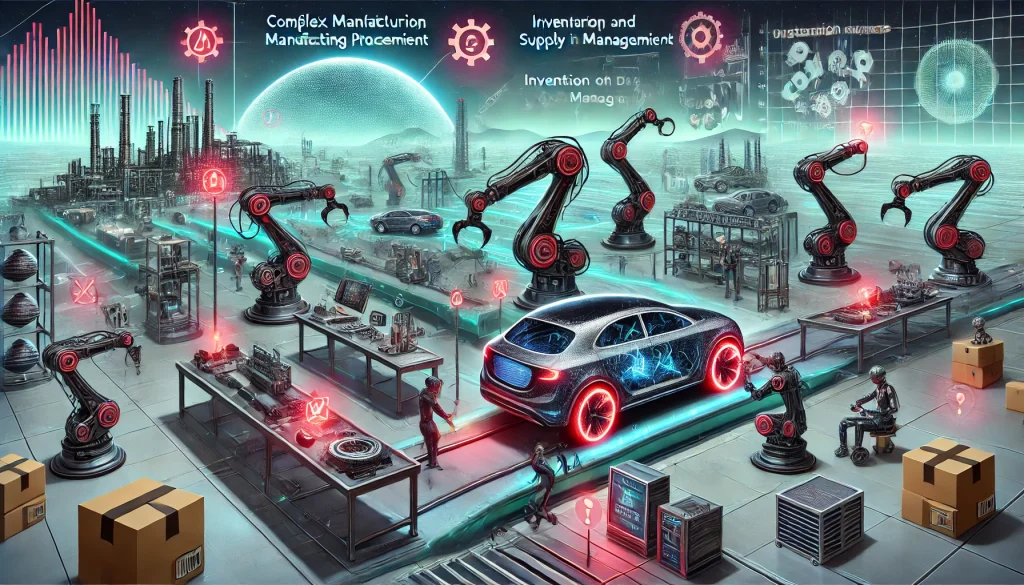
Future Vision
Our platform envisions a future where automotive customization is not just an option, but a standard expectation for consumers. In this future, every vehicle is a unique reflection of its owner, tailored to their specific tastes, preferences, and lifestyle. This vision is enabled by a combination of advanced manufacturing techniques, digital technologies, and data-driven insights that together create a seamless and personalized customer experience.
The future of automotive customization will be driven by flexible and modular manufacturing systems that allow for a wide range of customization options without compromising efficiency or quality. Technologies like 3D printing and robotic assembly will enable automakers to produce bespoke components and configurations on demand, reducing lead times and minimizing waste. These manufacturing innovations will be supported by a robust supply chain that can quickly adapt to changing consumer preferences and ensure the timely delivery of materials and components.
Digital platforms will play a central role in this future, providing consumers with intuitive tools to design and customize their vehicles. From online configurators to virtual reality (VR) experiences, customers will be able to explore and select every aspect of their vehicle, from exterior colors and interior materials to software-driven features and performance settings. These platforms will be powered by data analytics and artificial intelligence (AI), enabling automakers to offer personalized recommendations and optimize the customization process based on individual preferences and market trends.
Customization will also extend beyond the initial purchase, with software updates and over-the-air (OTA) upgrades allowing customers to continually personalize their vehicles over time. This could include new infotainment options, enhanced driver assistance features, and performance tuning adjustments, all delivered seamlessly through the vehicle’s digital ecosystem.
Sustainability will be a key focus in this future, with automakers using eco-friendly materials and processes to minimize the environmental impact of customization. From sourcing renewable materials to implementing energy-efficient production methods, the industry will prioritize sustainability without sacrificing personalization options.
Customer experience will be at the heart of this vision, with a focus on creating a smooth and enjoyable journey from customization to delivery. This includes transparent communication, timely updates, and high-quality customer service, ensuring that every aspect of the customization process is tailored to the needs and expectations of the consumer.
By embracing these innovations, the automotive industry can create a future where every vehicle is as unique as its driver, offering unparalleled levels of personalization, satisfaction, and brand loyalty.
Use Cases
- Modular Manufacturing Systems: Implementing flexible manufacturing techniques, such as 3D printing and robotic assembly, to produce customized vehicle components on demand.
- Online Customization Platforms: Developing digital platforms where customers can design and personalize their vehicles, with real-time visualizations and pricing information.
- Software-Driven Customization: Offering customizable software features, such as infotainment systems, driver assistance technologies, and performance tuning, that can be updated over time.
- Personalized Recommendations: Using AI and data analytics to provide customers with personalized suggestions based on their preferences and previous choices.
- Sustainable Customization: Incorporating eco-friendly materials and processes into the customization options, such as recycled interior fabrics or energy-efficient production methods.
- Over-the-Air (OTA) Updates: Enabling continuous personalization through software updates and upgrades that can be delivered remotely to the vehicle.
- Integrated Supply Chain Management: Creating a responsive supply chain that can quickly adapt to changing customization demands and ensure the timely delivery of materials.
- Virtual Reality (VR) Customization: Offering VR experiences that allow customers to explore and customize their vehicle in a fully immersive environment.
- Enhanced Customer Experience: Providing transparent communication, timely updates, and personalized customer service throughout the customization process.
- Brand-Consistent Personalization: Ensuring that customization options align with the brand’s identity while offering a high degree of personalization.
Target Users and Stakeholders
- Automotive Manufacturers: Companies seeking to differentiate their products and attract customers through extensive customization options.
- Consumers: Drivers who value personalization and want a vehicle that reflects their individual style and preferences.
- Tech Firms and Software Developers: Companies providing digital platforms, AI tools, and software solutions for automotive customization.
- Suppliers: Providers of materials and components needed for customized vehicles, working closely with automakers to meet specific demands.
- Dealerships and Retailers: Offering customized vehicles and providing personalized sales and service experiences to customers.
- Sustainability Advocates: Promoting eco-friendly customization options that reduce environmental impact.
- Brand and Marketing Teams: Ensuring that customization offerings align with the brand’s identity and appeal to target audiences.
- Data Privacy and Security Experts: Ensuring the secure handling of customer data used for personalization and customization.
- Regulatory Bodies: Overseeing compliance with regulations related to vehicle customization, sustainability, and data privacy.
- Investors and Venture Capital Firms: Funding innovations in automotive customization and supporting the growth of related technologies.
Key Competitors
- Tesla: Leading the way with customizable software features, OTA updates, and a strong focus on personalization within the digital vehicle ecosystem.
- BMW: Offering extensive customization options through its BMW Individual program, allowing customers to select bespoke colors, materials, and finishes.
- Audi: Providing a wide range of customization choices, including unique interior trims, exterior colors, and advanced infotainment systems.
- Porsche: Known for its highly personalized vehicles, with options for bespoke exterior designs, interior materials, and performance features.
- Mercedes-Benz: Emphasizing luxury and personalization, offering customers a variety of customization options for both exterior and interior features.
- Jaguar Land Rover: Offering bespoke customization services, including unique paint finishes, tailored interiors, and personalized technology features.
- Ford: Leveraging modular manufacturing and digital tools to offer a range of customization options, particularly in its performance and off-road vehicles.
- Volvo: Integrating sustainable materials and design elements into its customization offerings, with a focus on eco-friendly personalization.
- Ferrari: Providing ultra-luxury customization options, allowing customers to design one-of-a-kind vehicles with exclusive features and finishes.
- Maserati: Offering a high degree of personalization in its luxury vehicles, with options for unique colors, materials, and performance tuning.
Active Startups
- CustoMyCar: Specializes in digital platforms that enable consumers to customize their vehicles online with a wide range of options and real-time visualizations.
- ModuCar: Focuses on modular manufacturing systems for automotive customization, allowing for flexible and scalable production of bespoke components.
- EcoTune: Offers software-driven customization tools that optimize vehicle performance while enhancing fuel efficiency and reducing emissions.
4. AutoVR: Develops virtual reality (VR) experiences for automotive customization, providing customers with immersive environments to design their vehicles. - SustainAuto: Integrates sustainable materials and processes into automotive customization, offering eco-friendly options for environmentally conscious consumers.
- CustomDrive: Specializes in personalized software updates and OTA upgrades, allowing drivers to continuously customize their vehicle’s features and performance.
- PersonalizeIt: Provides AI-driven tools for personalized recommendations in vehicle customization, helping consumers make informed choices based on their preferences.
- GreenTrim: Focuses on sustainable interior materials, offering recycled and eco-friendly options for automotive customization.
- FlexiManufacture: Innovates in flexible manufacturing processes that support a wide range of customization options while maintaining efficiency and quality.
- AutoSync: Develops integrated supply chain management solutions for automotive customization, ensuring timely delivery and responsiveness to consumer demands.
Ongoing Work in Related Areas
- Advanced Manufacturing Research: Exploring new technologies such as 3D printing, robotic assembly, and modular systems to enable more flexible and cost-effective customization.
- Digital Customization Platforms: Developing user-friendly online configurators, VR tools, and AI-driven recommendation engines to enhance the consumer customization experience.
- Sustainable Materials Development: Innovating in the use of eco-friendly and renewable materials for automotive interiors, exteriors, and components.
- Over-the-Air (OTA) Updates: Enhancing the capability of vehicles to receive software updates and new features remotely, enabling continuous personalization.
- Supply Chain Optimization: Improving supply chain efficiency to support the production and delivery of customized vehicles, including just-in-time inventory management.
- Consumer Data Analytics: Leveraging data analytics to understand consumer preferences and trends, enabling more targeted and personalized customization options.
- Smart Manufacturing Ecosystems: Building integrated ecosystems that connect manufacturers, suppliers, and retailers to streamline the customization process.
- AI-Driven Personalization: Advancing AI technologies to provide more accurate and personalized customization recommendations based on consumer behavior and preferences.
- Regulatory Compliance and Standards: Establishing standards and regulations for automotive customization, particularly in areas such as safety, sustainability, and data privacy.
- Consumer Experience Innovation: Continuously improving the customer journey in automotive customization, from initial selection to delivery and post-purchase support.
Recent Investments
- CustoMyCar: $25M in Series A funding from automotive technology investors, February 2022, to expand its digital customization platform and enhance user experience.
- ModuCar: $30M in Series B funding led by manufacturing innovation-focused venture capital firms, June 2021, to scale its modular manufacturing systems.
- EcoTune: $20M in Seed funding from sustainability-focused investors, March 2022, to develop software-driven customization tools for eco-friendly vehicles.
- AutoVR: $18M in Series A funding from VR technology investors, September 2021, to create immersive VR experiences for automotive customization.
- SustainAuto: $22M in Series A funding from green technology investors, January 2022, to integrate sustainable materials into automotive customization.
- CustomDrive: $28M in Series B funding from automotive software investors, May 2022, to enhance its personalized software updates and OTA upgrades.
- PersonalizeIt: $15M in Seed funding from AI and data analytics investors, November 2021, to develop AI-driven tools for vehicle customization.
- GreenTrim: $12M in Seed funding from eco-material investors, April 2022, to innovate in sustainable interior materials for automotive applications.
- FlexiManufacture: $35M in Series B funding from industrial manufacturing investors, August 2021, to expand its flexible manufacturing processes.
- AutoSync: $25M in Series A funding from supply chain management investors, February 2022, to develop integrated supply chain solutions for automotive customization.
Market Maturity
The market for automotive customization is rapidly maturing as consumers increasingly seek vehicles that reflect their personal style and preferences. Established automakers and startups alike are investing heavily in technologies that enable greater levels of customization, from flexible manufacturing systems to digital platforms and AI-driven personalization tools.
Significant advancements in manufacturing processes, such as 3D printing and modular assembly, are allowing automakers to offer a wide range of customization options without compromising efficiency or quality. Digital technologies, including online configurators, VR tools, and OTA updates, are making it easier for consumers to personalize their vehicles and continuously update features over time.
The growing emphasis on sustainability is also driving innovation in the use of eco-friendly materials and processes in automotive customization. As consumers become more environmentally conscious, automakers are increasingly offering sustainable customization options that align with their values.
The market is expected to continue expanding as more consumers demand personalized vehicles, and as automakers develop new technologies and processes to meet this demand. However, challenges remain in managing the complexity of customization, ensuring quality and consistency, and balancing costs with the need to offer competitive pricing.
Summary
Consumers are increasingly seeking vehicles that reflect their personal style and preferences, driving significant changes in how vehicles are designed, manufactured, and sold. Advances in manufacturing and digital technologies are enabling greater levels of customization, from color choices and interior materials to software-driven features and performance tuning. Our proposed platform leverages modular manufacturing systems, online customization platforms, software-driven features, personalized recommendations, sustainable customization options, OTA updates, integrated supply chain management, VR customization, enhanced customer experience, and brand-consistent personalization to address the challenges of automotive customization.
Key pain points include complex manufacturing processes, inventory and supply chain management, quality control, integration of digital features, cost management, customer experience, scalability, data privacy and security, sustainability, and brand consistency. Target users include automotive manufacturers, consumers, tech firms, suppliers, dealerships, sustainability advocates, brand teams, data privacy experts, regulatory bodies, and investors.
By addressing these challenges and implementing innovative strategies, the automotive industry can create vehicles that are as unique as their drivers, offering unparalleled levels of personalization, satisfaction, and brand loyalty.
